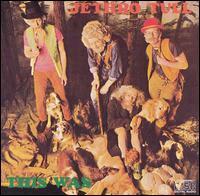
- Format: MP3

Jethro Tull was very much a blues band on their debut album, vaguely reminiscent of the Graham Bond Organization only more cohesive, and with greater commercial sense. The revelations about the group's roots on This Was — which was recorded during the summer of 1968 — can be astonishing, even 30 years after the fact. Original lead guitarist Mick Abrahams contributed to the songwriting and the singing, and his presence as a serious bluesman is felt throughout, often for the better: "Some Day the Sun Won't Shine for You," an Ian Anderson original that could just as easily be credited to Big Bill Broonzy or Robert Johnson; "Cat's Squirrel," Abrahams' big showcase, where he ventures into Eric Clapton territory; and "It's Breaking Me Up," which also features some pretty hot guitar from Abrahams. Roland Kirk's "Serenade to a Cuckoo" (the first song Anderson learned to play on flute), their jazziest track ever, is one of the best parts of the album. The drum solo on "Dharma for One" now seems like a mistake, but is understandable in the context of the time in which it was done. The one number here that everybody knows, "A Song for Jeffrey," almost pales amid these surroundings, but at the time it was a superb example of commercial psychedelic blues. This would be the last album of its kind by the group, as Abrahams' departure and the lure of more fertile inspiration tugged them toward English folk music. Curiously, the audio mix here is better than that on their second album, with a much stronger, harder group sound overall. In late 2001, This Was was reissued in a remastered edition with much crisper sound and three bonus tracks. The jazzy improvisation "One for John Gee" (a reference to the manager of the Marquee Club), the folky "Love Story" (which marked the end Mick Abrahams' tenure with the group), and the novelty piece "Christmas Song" have all been heard before but, more to the point, they're worth hearing again, especially in the fidelity they have here.